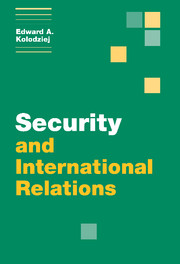Introduction
Published online by Cambridge University Press: 04 December 2009
Summary
“For every complex problem there is a simple solution. And it's always wrong.”
– H. L. MenckenSecurity is a complex and contested notion – heavily laden with emotion and deeply held values. Most people would agree that a security problem arises when someone – a person, gang or group, or state – threatens another's life, limb, or livelihood; say, a gunman in a dark, dead-end alley demanding your wallet or your life. Consider the dread that the inhabitants of London and Berlin must have felt during World War II when bombed by enemy planes or missiles. Think also about the Japanese survivors of Hiroshima, the first city to be destroyed by an atomic bomb. Put yourself in the place of New Yorkers on September 11, 2001, who witnessed first-hand the destruction of the World Trade Center, not to mention millions more on television around the world in real time. Imagine, too, the terror of the Tutsi and Hutu peoples of Rwanda in 1994 when thousands were killed in three months – estimates run to 800,000 – by a genocide launched by Hutu extremists using primitive machetes and garden hoes.
While few would likely dispute these examples of a security threat, many would extend the meaning of security to other values and interests. They would apply the term to environmental damage caused by global warming; or to the struggle for subsistence of billions of peoples in the developing world; or to human rights protections from capricious incarceration, torture, or genocide.
- Type
- Chapter
- Information
- Security and International Relations , pp. 1 - 8Publisher: Cambridge University PressPrint publication year: 2005

